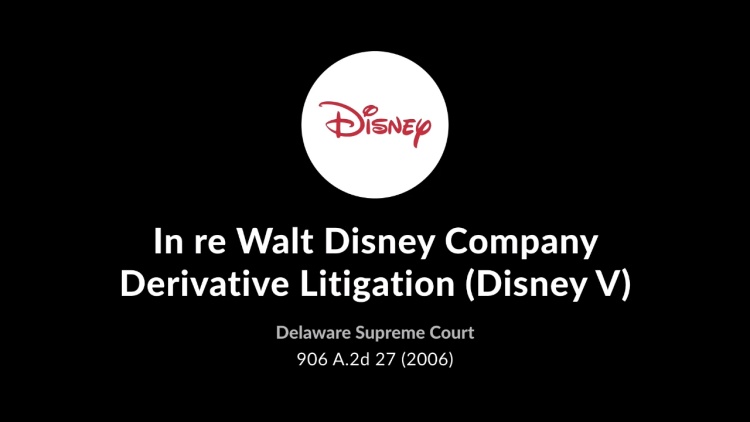In re Walt Disney Co. Derivative Litigation (Disney V)
Delaware Supreme Court
906 A.2d 27 (2006)

- Written by Sean Carroll, JD
Facts
The Walt Disney Company (Disney) hired Michael Ovitz as its president. The board of director’s compensation committee approved an employment agreement with Ovitz, which contained a nonfault-termination provision providing that if Ovitz left his employment with Disney through no fault of his own, he would receive a severance package. At its meeting, the compensation committee considered information that in the event of a nonfault termination, Ovitz would receive the value of his salary of $1 million per year and the value of his annual bonus payments of $7.5 million for the rest of the contract term, a $10 million termination fee, and an acceleration of his options for three million shares, which would be immediately exercisable at market price. The committee was also informed that the option portion of Ovitz’s severance package could reach a value of $92 million if Ovitz was terminated without cause after one year of employment. The committee also knew that Ovitz was leaving a very lucrative position to work for Disney and by doing so was sacrificing commissions of $150 to $200 million. Fourteen months after he was hired, Ovitz was terminated on a nonfault basis and received approximately $130 million under his severance package. After their original complaint was dismissed, shareholders (plaintiffs) filed a second amended complaint against Disney’s directors (defendants), claiming that the board breached its fiduciary duty and committed waste by approving the employment agreement without properly informing itself of the cost of the nonfault-termination provision. The Delaware Court of Chancery entered judgment in favor of the directors, finding that the compensation committee did not breach a fiduciary duty in approving the no-fault-termination provision. The court of chancery also found that the committee had not acted in bad faith, which it defined as an intentional dereliction of duty or conscious disregard for one’s responsibilities. The shareholders appeal, arguing that the court of chancery applied an incorrect definition of bad faith, that the committee was grossly negligent in approving the no-fault-termination terms because it failed to inform itself of material facts, and that the payment of severance to Ovitz constituted waste.
Rule of Law
Issue
Holding and Reasoning (Jacobs, J.)
What to do next…
Here's why 910,000 law students have relied on our case briefs:
- Written by law professors and practitioners, not other law students. 47,100 briefs, keyed to 997 casebooks. Top-notch customer support.
- The right amount of information, includes the facts, issues, rule of law, holding and reasoning, and any concurrences and dissents.
- Access in your classes, works on your mobile and tablet. Massive library of related video lessons and high quality multiple-choice questions.
- Easy to use, uniform format for every case brief. Written in plain English, not in legalese. Our briefs summarize and simplify; they don’t just repeat the court’s language.





